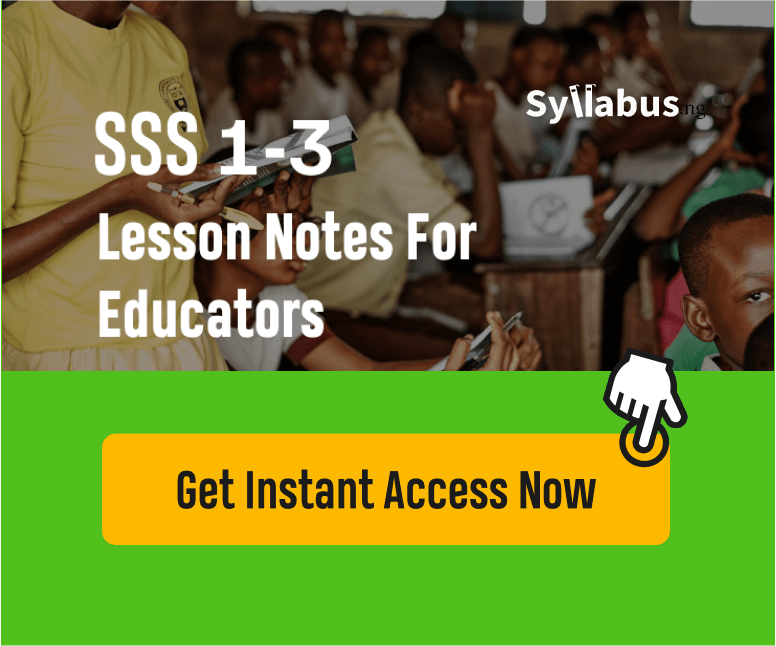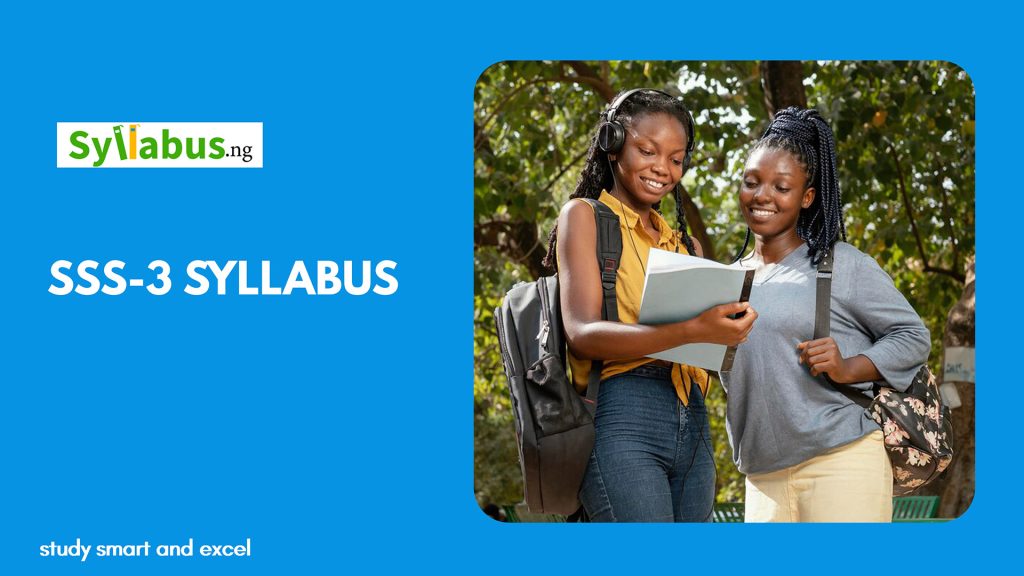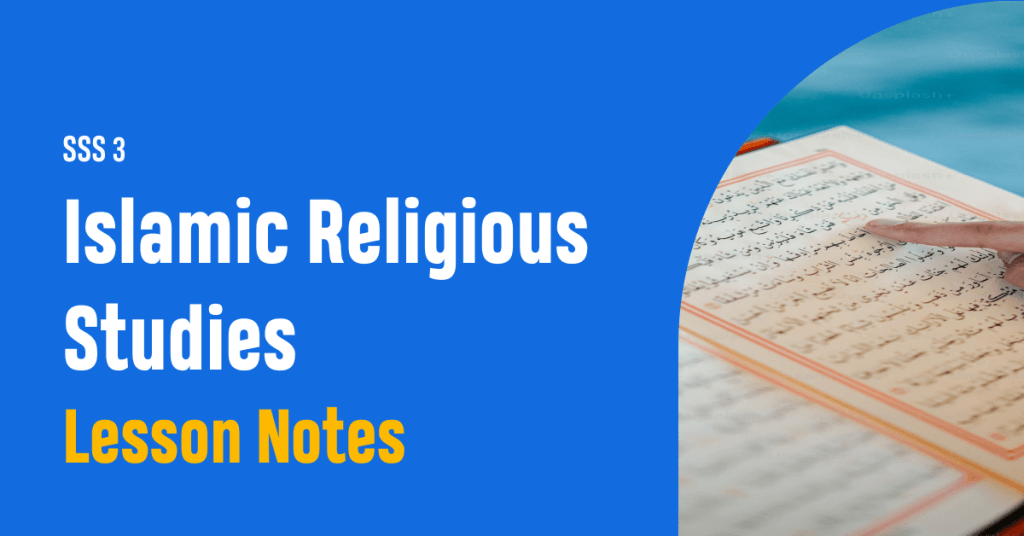SSS3 Catering and Craft Practices Scheme of Work
Download the Senior Secondary School 3 (SSS3) Unified Scheme of Work for Catering and Craft Practices to serve as a guide for educators

Home » SSS3 Scheme of Work » SSS3 Catering and Craft Practices Scheme of Work
Home » SSS3 Scheme of Work » SSS3 Catering and Craft Practices Scheme of WorkAbout SSS3 Catering and Craft Practices Scheme of Work
Catering and Crafts in SSS3 is a subject that teaches culinary arts and practical craftsmanship. It covers food preparation, nutrition, menu planning, and cooking techniques in catering. In crafts, students learn various artisanal skills like weaving, pottery, bead-making, and fabric design, fostering creativity and hands-on craftsmanship.
Studying Catering and Crafts in Senior Secondary Schools under the Lagos State Unified Scheme of Work offers a comprehensive foundation in culinary arts and practical craftsmanship. The curriculum typically begins with an introduction to the basic principles of catering, emphasizing hygiene, nutrition, and food safety regulations. Simultaneously, the Crafts component of the curriculum focuses on developing students’ skills in various handicrafts and creative arts. Practical sessions allow students to experiment with different materials and tools, fostering creativity and craftsmanship.
The Lagos State Unified Scheme of Work ensures a balanced approach, integrating theoretical lessons with practical applications to provide a holistic learning experience while preparing SSS3 students for the WASSCE.
Assessment Guide
Assessment in Catering and Crafts in SSS3 typically includes practical tasks such as preparing and presenting dishes or crafting handmade products. Students are evaluated on their skills in food preparation, creativity in crafts, adherence to safety and hygiene standards, and understanding of theoretical concepts like nutrition and design principles. This is done cumulatively in the WASSC exams.
Assessments are designed to evaluate knowledge acquisition and practical skills, preparing students for further studies in catering, hospitality management, or entrepreneurship in the culinary and crafts industries.
SSS3 First Term Scheme of Work for Catering and Craft Practices
| LAGOS STATE MINISTRY OF EDUCATION: UNIFIED SCHEMES OF WORK FOR SENIOR SECONDARY SCHOOLS | ||
| Catering and Craft Practices Scheme of Work for Senior Secondary Schools | ||
| CLASS | S.S.S. 3 | |
| SUBJECT | Catering and Craft Practice | |
| TERM | First Term | |
| WEEK | TOPICS | Learning Objectives |
| 1 | Resumption Test/Revision of last session work | By the end of the lesson, student should be able to: 1. answer most of the ressumption test correctly 2. recall some of the topics taught last term |
| 2 | Meal Planning -Meaning of meal planning -Importance of meal planning -Factors affecting meal planning | By the end of the lesson, student should be able to: 1. discuss meal planning 2. enumerate the importance of meal planning 3. state the factors affectting meal planning |
| 3 | Speacial menu Vegetarians -Types of vegetarians -Reason for vegetarian -Plan meal for vegetarian | By the end of the lesson, student should be able to: 1. identify vegetarians 2. highlight types of vegetarians 3. analyze the reason for vegetarian 4. plan a menu for vegetarian |
| 4 | Speacial menu Pregnant/lactating women | By the end of the lesson, student should be able to: 1. differentiate between pregnant and lactating women 2. identify the nutritional needs of pregnant women 3. state the guidelines for planning meal for lactating women |
| 5 | Special menu -Infants and toddlers | By the end of the lesson, student should be able to: 1. differentiate between infants and toddlers 2. state the characteristics of infant and toddlers that affects their nutritional needs 3. highlight the guidelines for meeting the nutritional needs of infants and toddlers |
| 6 | Speacial menu Adolescents | By the end of the lesson, student should be able to: 1. discuss adolescents 2. state the characteristics of adolescents 3. identify the nutritional requirements of adolescents 4. plan aday’s menu for the adolescents |
| 7 | Mid Term Test/ Open Day/Mid-Term Holiday | |
| 8 | Speacial Menu Aged/ Elderly | By the end of the lesson, student should be able to: 1. discuss the nutritional requirements for aged/ elderly 2. point out factors that influence the appetiate/ eating habits of the aged/elderly |
| 9 | Special menu -Manual and sedementary worker | By the end of the lesson, student should be able to 1. differentiate between manual workers and sudementary worker 2. suitable dishes for manual workers and sedemantary workers respectively |
| 10 | Special menu -Diabetic and hypertensive patients | By the end of the lesson, student should be able to 1. explain diabetic patients 2. discuss hypertensive patients 3.plan dishes that are suitable for diabetic patients 4. state the guidelines for providing meals for hypertensive patients |
| 11 | Speacial menu -Invalid and converlescent | By the end of the lesson, student should be able to 1 differentiate between invalid and converlescent 2. analyze the guidelines for providing meal for invalid and converlescents 3. plan a meal for invalid and converlescents |
| 12 | REVISION | |
| 13 | EXAMINATION | |
SSS3 Second Term Scheme of Work for Catering and Craft Practices
| CLASS | S.S.S. 3 | |
| SUBJECT | Catering and Craft Practice | |
| TERM | Second Term | |
| WEEK | TOPICS | Learning Objectives |
| 1 | Resumption Test/Revision | By the end of the lesson, student should be able to: 1. answer test questions correctly 2. recall the memory of previous topics in second term work |
| 2 | House Keeping Department -Meaning of Housekeeping -Areas of Housekeeping -Duties and responsibility of housekeeping personnel | By the end of the lesson, student should be able to 1. discuss the meaning of housekeeping 2. figure out the areas of housekeeping 3. identify the duties and responsibility of house keeping personnel |
| 3 | Bed Making -Meaning of bed -Types of bed -Bed lining -Procedures for bed making | By the end of the lesson, student should be able to 1. explain bed 2. point out types of bed 3. discuss bed linen with examples 4. explain the procedures for bed making |
| 4 | Project and Practical on bed making | By the end of the lesson, student should be able to 1. demonstrate and make a bed |
| 5 | Hotel Receptionist -Meaning of receptionist -Qualities of a good receptionist -Responsibilities of a receptionist | By the end of the lesson, student should be able to 1. explain receptionist 2. highlight qualities of a good receptionist 3. discuss the responsibilities of a receptionist |
| 6 | Front office -Meaning of front office -Personnel in front office and their duties -Attributes of front office personnel -Front office activities | By the end of the lesson, student should be able to 1. dscuss front office 2. identify various personnel in front office and main duties 3. explain the attributes of front office personnel |
| 7-14 | REVISION OF PAST QUESTIONS/WASSCE & NECO EXAMINATION | |
Achievement Standards
At the end of the SSS3 session, students can;
- Make a menu for invalid and convalescent;
- Enumerate the importance of meal planning;
- Plan a menu for vegetarians, pregnant women, lactating women, infants, and toddlers;
- Identify the duties and responsibilities of housekeeping personnel;
- Demonstrate and make a bed;
- Highlight the responsibilities of a good receptionist.
Recommended Catering and Craft Practices Textbooks for Senior Secondary School 3
There are no given recommended textbooks for Catering and Craft Practices, but materials and resources for study and teaching can be sourced online.
































